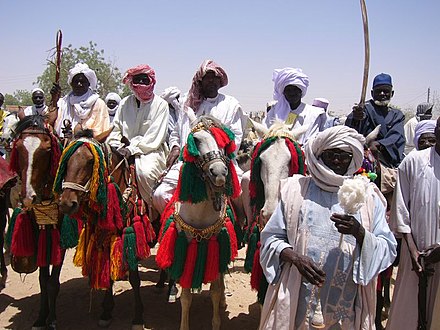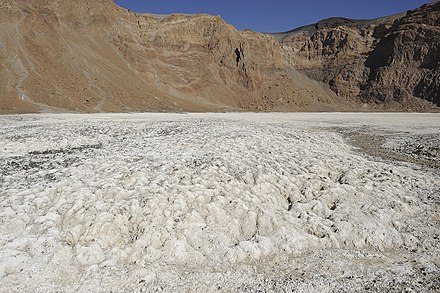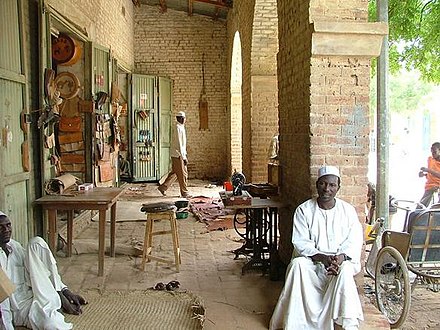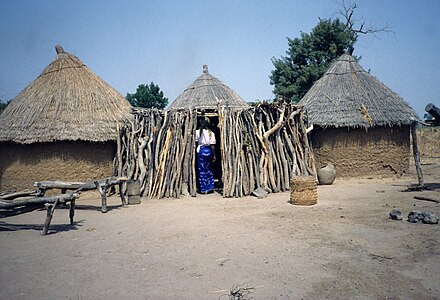Chad - sovereign state in central Africa
Because of ongoing political turmoil and jihadist activity many governments advise against all but essential travel to Chad. In addition, all travel within 30 km of all international borders, and in northern Chad is unsafe. The capital, N'Djamena, is only safe by comparison with these areas. Terrorists are very likely to try to carry out attacks in Chad, and there is a heightened threat of kidnapping.
Chad (Arabic: تشاد, French: Tchad) is a landlocked country situated in the centre of Africa. Chad is home to more than 200 different ethnic groups (making it one of the most diverse countries in the world) and there are national parks, desert lakes, sand dunes, canyons and camel caravans that will interest the daring and adventurous.
Regions

The northern part of the country, which is also the driest.
The location of the capital, this region is the central part of Chad.
In the south (Soudanian) part of Chad, the climate is wetter.
Cities
- N'Djamena — the national capital and largest city
- Moundou — the country's second-largest city
- Abéché — capital of Ouaddai province and historical capital of the Wadai Empire
- Faya — largest city in the north of the country
Understand
History
For more than 2,000 years, the Chadian Basin has been inhabited by agricultural and sedentary peoples. The earliest of these were the legendary Sao, known from artefacts and oral histories. The Sao fell to the Kanem Empire, the first and longest-lasting of the empires that developed in Chad's Sahelian strip by the end of the 1st millennium AD. The power of Kanem and its successors was based on control of the trans-Saharan trade routes that passed through the region.
French colonial expansion led to the creation of the Territoire Militaire des Pays et Protectorats du Tchad in 1900. By 1920, France had secured full control of the colony and incorporated it as part of French Equatorial Africa. The French primarily viewed the colony as an unimportant source of untrained labour and raw cotton. The colonial administration in Chad was critically understaffed and had to rely on the dregs of the French civil service.
Fifteen thousand Chadian soldiers fought for Free France during World War II and after the war ended, France granted Chad the status of overseas territory and its inhabitants the right to elect representatives to both the French National Assembly and a Chadian assembly. Chad was granted independence on 11 August 1960 with François Tombalbaye, as its first president. Two years later, Tombalbaye banned opposition parties and established a one-party system. In 1965 Muslims began a civil war. Tombalbaye was overthrown and killed in 1975, but the insurgency continued. In 1979 the rebel factions conquered the capital, and all central authority in the country collapsed. The disintegration of Chad caused the collapse of France's position in the country, and a civil war in which the Libyans (unsuccessfully) became involved.
A semblance of peace was finally restored in 1990. The government eventually drafted a democratic constitution, and held flawed presidential elections in 1996 and 2001. In 1998, a rebellion broke out in northern Chad, which sporadically flares up despite several peace agreements between the government and the rebels. In 2005 new rebel groups emerged in western Sudan and have made probing attacks into eastern Chad. In 2005, President Idriss Deby won a referendum to remove constitutional term limits. In 2008, an attempted coup rocked the capital. Another coup attempt occurred in 2013. Deby died in April 2021, the nation's National Assembly and government were dissolved and national leadership was replaced with a transitional military council.
Although the country is wealthy in natural resources, widespread corruption and political instability mean that only a small segment of the population receives the wealth. Since the 2000s, oil has become the country's largest industry, even superseding the traditional cotton industry. It is believed that the country has one of the largest oil deposits in the world.
Climate
Each year a tropical weather system known as the inter-tropical front crosses Chad from south to north, bringing a wet season that lasts from May to October in the south, and from June to September in the Sahel.
Landscape
The country's landscape comprises broad, arid plains in the centre, desert in the north, mountains in the northwest, and lowlands in the south. Lowest point: Djourab Depression (160 m/525 ft). Highest point: Emi Koussi (3,415 m/11,204 ft).
The dominant physical structure is a wide basin bounded to the north, east and south by mountain ranges such as the Ennedi Plateau in the north-east. Lake Chad, after which the country is named, is the remains of an immense lake that occupied of the Chadian Basin 7,000 years ago. Although in the 21st century it covers only , and its surface area is subject to heavy seasonal fluctuations, the lake is Africa's second largest wetland.
Talk
The main languages of Chad are Arabic and French. Few Chadians other than the educated and well-travelled speak literary Arabic; however, a dialect of Arabic known as "Chadian Arabic" is much more widely spoken and is the closest thing the country has to a trade language. Chadian Arabic is significantly different from literary Arabic, but similar to the dialects of Sudan and Egypt. Literary Arabic speakers can typically understand Chadian Arabic but the reverse is not true. Over one hundred indigenous languages are also spoken.
Get in

Visa
As is the case with many African countries, almost everyone requires a visa to visit Chad. Costs may vary per Embassy. Europe (including UK) is served by Chadian embassies in Brussels and Paris. A single entry visa (up to 1 month) costs 70 €, a multiple entry visa for 1-3 months costs 100 € (2022).
In the USA, a single-entry visa costs US$100 for 1 month and multiple-entry visas cost US$150 (3 months) or US$200 (6 months). A letter of invitation is required.
Citizens of the following countries do not require a visa: Benin, Burkina Faso, Cameroon, Central African Republic, Congo, Ivory Coast, Gabon, Equatorial Guinea, Mauritania, Niger and Senegal.
Registration with the local authorities is compulsory within 72 hours after arrival and requires a further passport photo and your passport. You also have to report to the police in the regions where you’ll be staying/visiting sights, but any good travel company will arrange both for you swiftly. There is a 'tourist tax' of 5,000 CFA per person per site (Guelta d'Archei for example is one, nearby Terkei mountain as well, as are Ounianga Kebir and Ounianga Serir).
By plane

Air France has daily flights from Paris to N'Djaména. Ethiopia Airlines flies to Addis Ababa, Turkish airlines to Istanbul, Royal Air Maroc to Casablanca, Sudan Airways to Khartoum, Egypt Air to Cairo, and Camair-co to Douala.
By train
There are no usable rail links.
By car
Roads are in disrepair and are typically unpaved. There is a paved road which runs from Massakory in the north through N'Djamena on to Guelendeng, Bongor, Kelo, Moundou, Doba, Koumra, Sarh, and Kyabe. The other main paved road is between N'Djamena and Abeche, 700km to the east. These are the best roads in the country, but still there are numerous potholes and as it runs through the centre of a number of small villages, drivers should exercise caution and moderate speeds even while on the main road. The road between N'Djamena and Abeche is a toll road, with toll stations every 80km where a fixed rate of 500 CFA per car has to be paid.
There are several border crossings with Cameroon, most notably via Kousseri near N'Djamena and near the towns of Bongor and Lere. Be very careful, drive defensively, and don't stop unless absolutely necessary. Do not drive at night, as coupeurs de route (road bandits) are common. They are a particular concern along the two roads leading out of Guelendeng, towards Ba-Illi (where expats were attacked in two separate incidents in 2005, resulting in the death of one Catholic nun) and towards Bongor.
By bus

Get around
In N'Djamena there are vehicle taxis. In some major towns, such as Moundou and Sarh, there are "clandos" - motorcycle taxis - for getting around town.
In October 2018, a domestic Chadian airline was launched, Tchadia Air. It was placed into liquidation in 2022. Charter flights exist to Zakouma NP and Faya-Largeau Airport (for Ennedi), and are used by the more upmarket tours around Chad.
Tours
Due to the inaccessibility of most of the country, any substantial visit will be by an organised tour. Local companies such as SVS , Tchad Evasion and Eyte Voyages offer itineraries for private groups and fixed date group tours. Their tours and/or their capabilities are also resold via the more adventurous US/UK/European tour operators._2007_-_TEMPORARY_TOURIST_LICENSE_PLATE.jpg/440px-TCHAD_(CHAD)_2007_-_TEMPORARY_TOURIST_LICENSE_PLATE.jpg)
See
Chad is the quintessential destination to experience the Sahara desert: its ecosystem, but also its past and present forms of human habitation. The Ennedi Massif is a picturesque sandstone bulwark in the middle of the Sahara, which was formed by erosion from wind and temperature. The area is also known for its rock paintings. The Guelta d'Archei is one of the rare pockets of water in the Ennedi, inhabited by the West African crocodile and frequented by camel caravans. The Lakes of Ounianga are a group of 18 ancient lakes with an unique hydrological system. Both the Ennedi Massif and the Lakes of Ounianga are UNESCO World Heritage Sites.
Since the takeover by the NGO African Parks in 2010, Zakouma National Park, 10.847778°, 19.647778°. has developed itself into a prime destination for safari connaisseurs. Poaching has been virtually eliminated and wildlife numbers are thriving. Part of the Sudan-Guinea Savannah vegetation zone, Zakouma’s floodplains, rivers, marshes and pans are a sanctuary for West and Central African wildlife. After reintroduction of the Black Rhino in 2018, it also is a ‘Big Five Park’.
Football is the most popular sport in Chad with Les Sao being the international tournament. The Chadian national team have never qualified in the World Cup or the African Cup of Nations. However, home matches are only played at the Idriss Mahamat Ouya Stadium.
Other sites of interest:
- Oasis of Faya. - the largest oasis in northern Chad.
- Tibesti Mountains - a mountain range in the far north, with the volcano of Emi Koussi and the domain of the Toubou people
- Lake Chad. - large border lake, covered by a hundred islands and islets of which many are inhabited.
Do
Gerewol is a a week-long festival, held yearly in late September in the southwest of Chad. The men of the nomadic Woodabe tribe, herding their cattle around Cameroon, Chad, Niger and Nigeria, congregate to dress up and dance in order to attract a new wife. The festival locations are impossible to find independently, so as a foreigner without links to the community the only way to experience it will be as part of an organized small group tour.
Buy
Money
The currency of the country is the Central African <abbr title="_Communauté Financière d'Afrique_ or Financial Community of Africa">CFA</abbr> franc, denoted FCFA (ISO currency code: XAF). It's also used by five other Central African countries. It is interchangeable at par with the West African CFA franc (XOF), which is used by six countries. Both currencies are fixed at a rate of €1 = 655.957 CFA francs.
There are no restrictions on bringing foreign currencies into Chad. Euros and US dollars are often accepted in payment. Chad is an expensive place compared to much of Africa, especially regarding accommodation and transport. Outside of the places frequented by expats, a soft drink will cost between 300 and 500 CFA.
ATMs
There are Ecobank ATMs in Chad where you can withdraw cash with a Mastercard or Visa card.

Eat
Meat dishes are very popular in Chad, and foreigners speak highly of the meat. Lamb and camel meat are common and tasty. Food is usually eaten without utensils, and hand sanitizer may be a good precaution. Muslims find it offensive to eat with the left hand. If eating with or being served by Muslims in Chad, eat with your right hand only.
Follow common health travel guidelines concerning raw fruit and cooking requirements to avoid disease.
Drink
In general, do not drink unfiltered water in Chad. Typhoid and other disease carriers are often present in unfiltered water. Bottled water should be safe, but make sure the bottle is properly sealed, as some street vendors will take old bottles and refill them with unfiltered water.
Soft drinks are popular in Chad and are generally safe to drink. Coca-Cola, Sprite, Fanta and Top (a fruit-flavored soft drink) are the most popular.
Hot drinks should usually be safe to drink since the water has been boiled. Tea, coffee, and hot milk are very popular.
Chad is a secular country, but the north and center are predominantly Muslim. It is therefore sometimes difficult (and not well regarded) to find and consume alcohol outside of the cities. It's no problem in the south and in N'Djamena.
Sleep
 Years ago few hotels existed in Chad, but now N'Djamena hosts a myriad of affordable options plus more upmarket French and US chain hotels.
Years ago few hotels existed in Chad, but now N'Djamena hosts a myriad of affordable options plus more upmarket French and US chain hotels.
Outside of the capital very few hotels or accommodation options exist – in the desert these are non-existent.
Zakouma NP has 2 safari lodges: the expensive Tinga Camp and the uber-expensive Camp Nomade (by invitation only).
Stay safe
There continues to be potential for instability in Chad, particularly in its border regions and in the run-up to and during major political events. The Lake Chad region (threat of Boko Haram jihadists) and the other border areas are considered the most dangerous due to potential for armed conflict and minefields.
N'Djamena is relatively safe, although one should be wary of petty street crime and corrupt police/officials who will strictly enforce the 'no photography'-rule.
Most border crossings are extremely difficult (Sudan and Libya not being viable options) although the border crossings with Niger and Cameroon are relatively painless.
Floodings are another risk factor: during the rainy season (roughly June - September) heavy rain on the dry ground repeatedly leads to flooding and landslides and as a result to damage to infrastructure such as roads and bridges, and even loss of lifes.
Stay healthy
Drink water brands you recognize from stores. Eat at restaurants recommended to you by friends and locals you trust. Eat food that has been freshly prepared and cooked well. If you are eating local dishes, make sure the food was freshly prepared, cooked well, and still warm from the grill or cooking pot. Wash your hands often.
Ensure your vaccinations are up to date before visiting Chad. Proof of Yellow fever and Covid vaccinations are mandatory to enter the country.
The country is in the African Meningitis Belt. Malaria is the country's deadliest disease. The capital N'Djamena and the South in general lie in the high risk zone for mosquitos. The drier northern region (including Ennedi) sees fewer of them, though they may occur in oases such as Ounianga.
Respect
There are 200 distinct ethnic groups. In the north and center: Arabs, Gorane (Toubou, Daza, Kreda), Zaghawa, Kanembou, Ouaddai, Baguirmi, Hadjerai, Fulbe, Kotoko, Hausa, Boulala, and Maba, most of whom are Muslim; in the south: Sara (Ngambaye, Mbaye, Goulaye), Moundang, Moussei, Massa, most of whom are Christian or animist; about 1,000 French citizens live in Chad.
The Chadian-Libyan conflict is something to be avoided at all times; Chadians known to be living in Libya have been tortured and murdered on previous occasions.
As in other Sahel countries, natives are reluctant to be photographed, so always ask. Also there is a general ban on photography for anything that might be of any military or governmental importance.
Connect
The rate of internet use is low – 10% of the population as of 2020.
Social media sites including Facebook, Twitter, and WhatsApp have been intermittently blocked since March 2018 and then are only accessible via VPN. The 3g coverage across the populated areas is good, but receiving data outside of N'Djamena is only possible with a Chadian sim and just now and then in the bigger towns (and outside of peak hours).